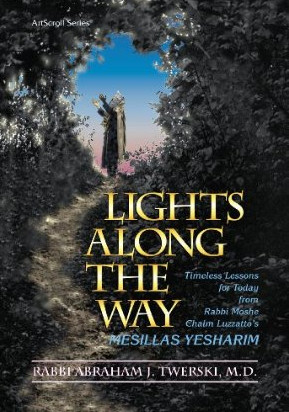Kosher Bookworm: Tu B’Av and the coming of Elul
With the summer season nearing its end we now become ever more mindful of the upcoming season of the High Holidays and their themes and observances. However, we first have coming up next week what Rabbi Abraham Twerski calls the greatest of our holidays, Tu B’Av.
This festive signpost heralding our concern for the value of marriage in our society brings to mind the many other happy and festive observances that will hopefully fill the many days ahead for all.
One literary work that should be given its fair due at this time of year, is a book written over three hundred years ago and of increasing moral importance and relevence to this very day.
In two essays written by Rabbi Twerski in “Mesillat Yesharim,” a work written by Rav Moshe Chaim Luzzatto, the Ramchal, is given great prominence.
The first, “Declaration of Independence vs. Mesillat Yesharim” dealing with the rights of humanity, Rabbi Twerski cites Luzzatto’s work with the following observation:
“Ramchal begins his epochal work with a chapter entitled, ‘The Obligation of a Person in His World.’ This sets the theme for the entire book. If a person has inalienable rights, then he is free, within accepted limits, to decide how he wishes to exercise these rights.”
Further on, Rabbi Twerski states that the “Ramchal would fully agree with ‘life, liberty, and the pursuit of happiness.’
“Life, because the Torah says, ‘You shall observe My decrees and My laws which man shall carry out and by which he shall live.’
“Liberty, because the Torah says, ‘Proclaim liberty throughout the land for all its inhabitants.’
“Pursuit of happiness, because the Torah says, ‘You shall be completely joyous.’
“These are inalienable mitzvoth, not rights” notes Rabbi Twerski, in an attempt to give the Declaration ideology the status of sacred writ.
This take on our Declaration of Independence brings into sharp focus the relevance of the writings of the Ramchal to the very foundational concepts of our republic.
In his second essay entitled, “Tu B’Av – The Greatest of Our Holidays,” Rabbi Twerski once again citing the Ramchal’s work states as follows:
“Living a Torah life requires more than observance of Halachot. It requires that a person be driven by the will to do what G-d wants, and this is the all-important area of middot.”
Thus, Rabbi Twerski adds an essential element of morality to the concept of mitzvoth as they concern interpersonal relationships.
He further goes into great detail as to how this impacts human relationships, from casual friendships to marriage.
This view of Luzzatto’s intellectual legacy was shared by many including Rabbi Aryeh Kaplan, of blessed memory, a noted scholar of Luzzatto’s works in his own right, who stated that:
“Luzzatto was one of the most brilliant thinkers of the past several centuries. Both his depth of thought and systematic mind are evident in all his works.
“Over two hundred years ago, the Vilna Gaon declared that Luzzatto had the most profound understanding of Judaism that any mortal human could attain. He furthermore stated that if Luzzatto were alive in his generation, he would go by foot from Vilna to Italy to sit at his feet and learn from him.”
To get a good idea as to what the Ramchal is all about, especially during the month of Ellul, when the study of Mesillat Yesharim is most appropriate, I suggest Rabbi Twerski’s truly lucid and most practical user friendly commentary based upon Mesillat Yesharim, entitled, “Lights Along The Way” [Artscroll 1995-2009] now in its eighth printing.
Also, from a variant point of view, there is “Mesillat Yesharim” [Jewish Publication Society, 2010] with a detailed and truly scholarly introduction and commentary by Dr. Ira F. Stone.
Still, as a work in progress, we have to date the five volumes in print of “Ascending The Path” by Rabbi Yaakov Hillel, a scholarly work sponsored by Lawrence residents Debra and Richard Parkoff. Read, enjoy and most important of all, learn.

 53.0°,
Overcast
53.0°,
Overcast 




